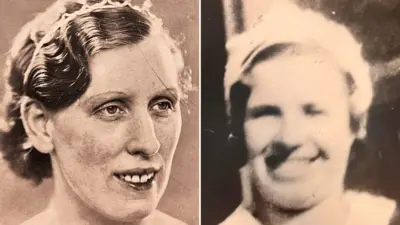We've updated our Privacy and Cookies Policy
We've made some important changes to our Privacy and Cookies Policy and we want you to know what this means for you and your data.
Radiotherapy 'wrongly stigmatised as second best'
- Author, VIEWPOINT Dr Ricky Sharma, University of Oxford and
- Role, Professor Gillies McKenna, Director of Cancer Research UK
Chemotherapy is perceived as the 'backbone' of cancer treatments, while radiotherapy is perceived as 'second best'.
But in this week's Scrubbing Up, cancer specialists Dr Ricky Sharma and Professor Gillies McKenna of the Medical Research Council's Gray Institute for Radiation Oncology and Biology warn that the UK risks falling behind the rest of the world in developing effective treatments for cancer and say funding new forms of radiotherapy must be a priority.
It is over a century since Wilhelm Roentgen "photographed" his wife's hand, including her wedding ring, with the very first X-ray picture.
Later, the Nobel prize-winning research of Marie Curie and other pioneers demonstrated that radiation could be used not only to diagnose diseases, but to treat cancer effectively, creating the field of radiotherapy - the use of radiation to treat cancer.
Chemotherapy - the public's choice
Following these discoveries, British scientists and physicians led the world in developing new treatments for cancer.
Although cancer specialists in the UK prescribe both chemotherapy and radiotherapy, the public has been led to believe that new chemotherapy drugs offer the greatest promise as the 'magic bullet' for the effective treatment of cancer.
The reality is that surgery and radiotherapy are the main curative treatments for cancers in adults. Over half a century later, we are still waiting for any chemotherapy to be as effective as radiotherapy for curing cancer.
Despite its effectiveness, the image of radiotherapy has been stigmatised in society. When it is offered, patients often wrongly assume they will be getting 'second best' and will suffer lots of unpleasant side-effects.
Unfortunately, when radiotherapy does hit the headlines the story is about the very rare occasions when there have been mistakes. In reality, millions of patients are successfully treated each year with few ill-effects.
In fact, radiotherapy has among the highest level of quality assurance of all the medical specialties.
The status of radiotherapy as an 'orphan' speciality has been made worse by a decline in funding available for research over the last two decades.
A national report published in 2003 warned that if this situation was not reversed, the study of the biology underlying radiotherapy - radiobiology - would no longer be sustainable as an academic discipline in the UK.
Since this report was published, Europe's largest charity, Cancer Research UK, and the Medical Research Council have combined forces to inject significant amounts of funding into radiobiology research, particularly at the Gray Institute of Oxford University.
Routine improvements needed
But however successful this initiative might be - and first reports look promising - this fundamental science cannot be translated into a genuine benefit for patients in the NHS unless drastic improvements are made in the delivery of routine radiotherapy in the UK.
In day-to-day clinical practice the UK lags behind other developed countries in delivering radiotherapy that is targeted directly on the tumour and affecting less of the normal surrounding tissue.
This means that the long-term side effects of radiotherapy treatments are worse for many patients than they need be.
Similarly, particle therapy is a special type of radiotherapy where protons or other atomic ions are used to treat cancer.
At present, adults and children with cancer who need particle therapy have to travel abroad to receive this treatment. Many of these patients are funded by the NHS because this therapy is the best treatment for them.
But they can't get it in the UK.
As the UK rediscovers the scientific potential of radiobiology, exciting new frontiers of biologically directed radiotherapy treatments are opening up in UK laboratories.
When UK scientists make great leaps forward in the laboratory, we want patients in NHS hospitals to take part in the clinical trials of these new treatments.
We don't want to see other countries run trials to show that our scientific discoveries are effective treatments for patients with cancer.
The funding provided by charities and research councils for basic science in radiobiology has to be matched by government initiatives to create a clinical trials network which can rapidly convert laboratory breakthroughs into new treatments for NHS cancer patients.
Historically, the UK was a leader in this form of cancer treatment. Now is the time for it to become one again.
Top Stories
More to explore
Most read
Content is not available








